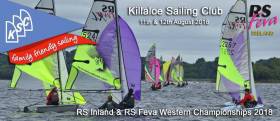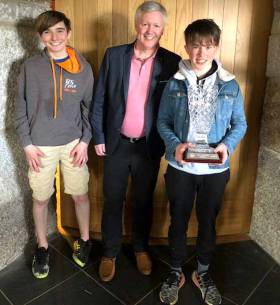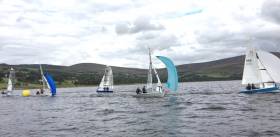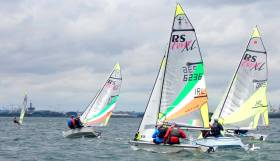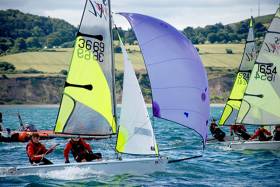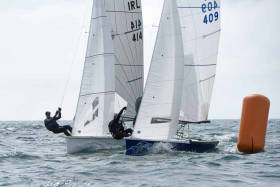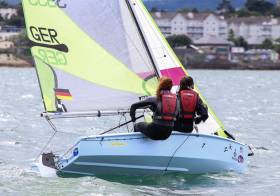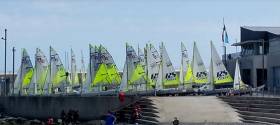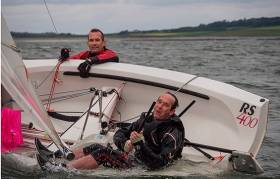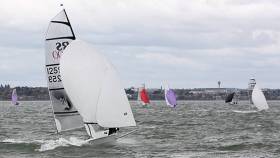Displaying items by tag: RS Feva
RS Inlands Start Today In Killaloe
#RS - Killaloe Sailing Club is hosting the RS Inland and RS Feva Western Championships this weekend, starting today Saturday 11 August.
The RS sailing community will be out in force on Lough Derg for the weekend, with full camping facilities available at the club and a barbecue set for this evening at 6.30pm.
For more details on the event see the RS Ireland website HERE.
Royal Irish Yacht Club Pair Win RS Feva East Coast Championships
Counting four first places Tim Norwood and Finn Cleary of the host club won the six race 2018 RS Feva East Coast Championships by a clear margin of eight nett points at the Royal Irish Yacht Club.
Race over two days the 13-boat fleet drew entries from five different clubs but no one could match the speed of Norwood and Cleary.
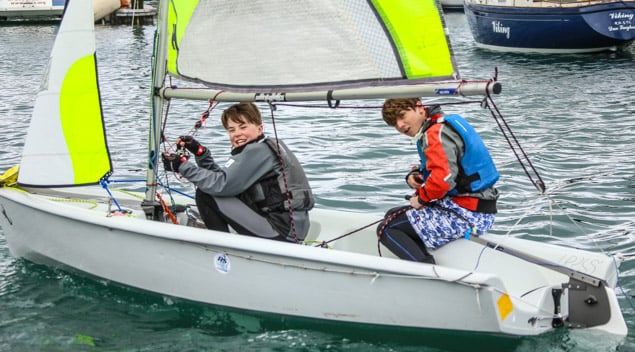 Tim Norwood and Finn Cleary had four firsts from six races Photo: Afloat.ie
Tim Norwood and Finn Cleary had four firsts from six races Photo: Afloat.ie
Second overall went to Howth Yacht Club's Tom O'Neill and Adam Walsh. Blessington Sailing Club visitors Lily Thorup and Sibeal Nic Giolla were third overall.
In one of his first roles as RIYC Commodore, Joe Costello presented the overall prizes.
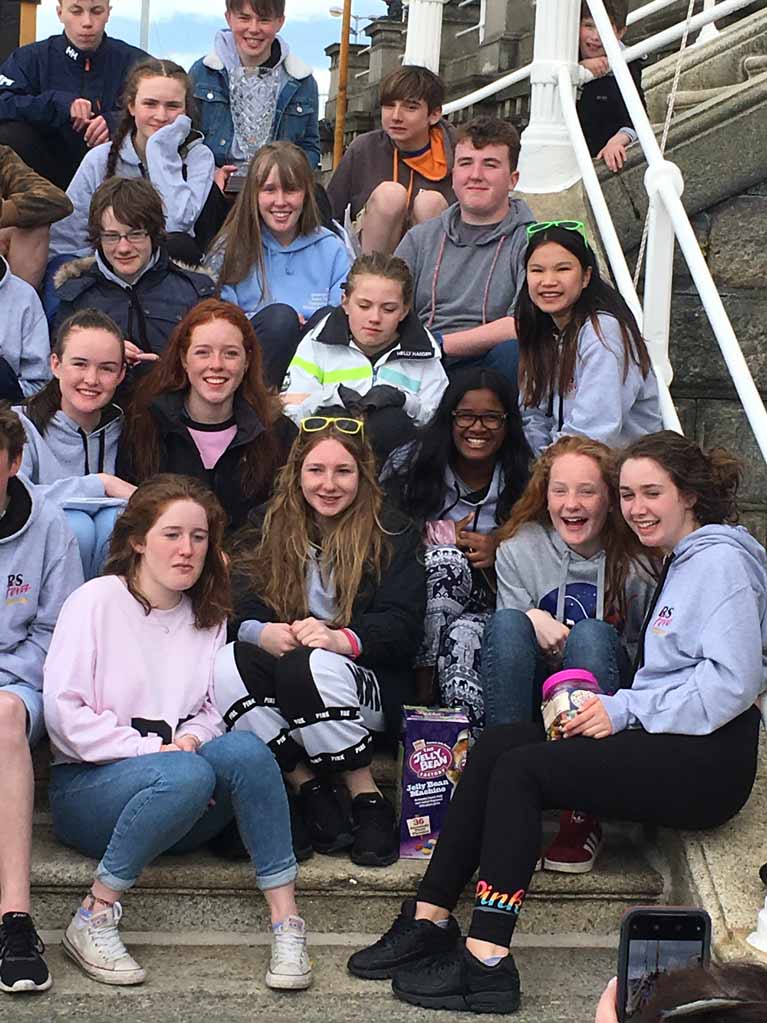 RS Feva sailors gathered on the steps of the RIYC
RS Feva sailors gathered on the steps of the RIYC
Top five overall:
1 Tim Norwood and Finn Cleary
2 Tom O'Neill and Adam Walsh
3 Lily Thorup and Sibeal Nic Giolla
4 Elysia O'Leary Lily Dwyer RSGYC
5 Christopher Evans Garrett Harry Shackleton
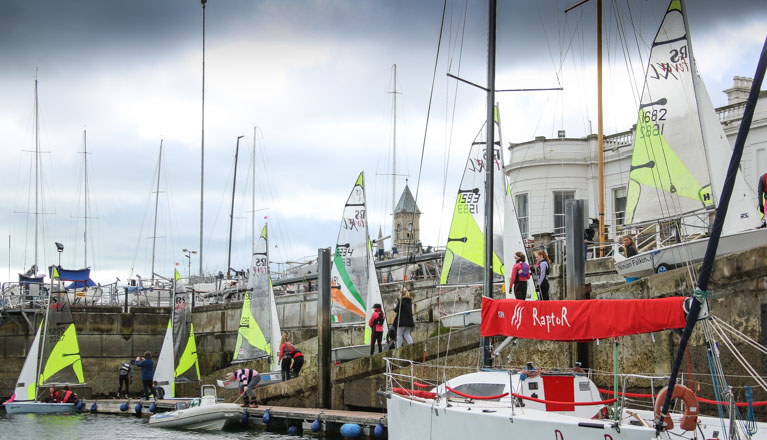 The RS Feva dinghy fleet launch from the RIYC slipway Photo: Afloat.ie
The RS Feva dinghy fleet launch from the RIYC slipway Photo: Afloat.ie
RS200, RS400 & RS Feva Fleets Gather at Blessington Sailing Club for Inland Championships
Over RS Sailing 40 crews arrived at Blessington Sailing Club to the clubs usual very friendly hospitality to join the newly established local fleet of RS200’s writes Kevin Brazel. Download full results below.
With a 1300 first gun on Saturday morning and a forecast for dying breeze, race officer Robin Gray from Ballyholme was eager to get things off in his ever efficient way.
The standard windward leeward course with a gate was set in a typical shifty lake breeze. The RS400 fleet was sent off first but a major shift before the first top mark caused the race to be abandoned. At the second time of asking, Trevor D’Arcy and crew Alan McLemon came out on top in Race one.
A testament to the tight racing enjoyed by the RS400 fleet was the fact that there was a different winner in each race. Rob Hastings and crew Lawrence from the Royal North took race two. Monkstown’s Robbie O’Sullivan and Phil McFountain won race three. With the most consistent top results and a win in race 4 Paul McMahon & Simon Martin from Howth took the title of RS400 2017 inland champions
In the RS200 fleet Marty O’Leary and Rachel Williamson showed more of the speed they’ve had all season. The only blot on a their score card was an OCS in race 4 when Marty was a little premature, much to the annoyance of Rachel. Emmet Ryan and Kevin Brazel, who were making the change in “weight division” to the 200 for the weekend took second place with Greystone’s Frank O’Rourke with Diana Kissane in third.
The youth class, the RS Feva turned out to be a very competitive fleet, with the winner, Royal St. George’s Marcus O’Leary showing consistency is key. Not winning a race but being always in the front 3 to take the overall win. Second was Max and Georgia Goodbody from the Royal Irish, and third was Alan Leddy crewed by Greg Houlihan from Greystones.
Once on shore the Blessington members put on a great show, with a michelin-star barbeque on the beach, cheap beer and music until late to keep the many sailors staying around the club entertained, the best apres-sail anyone in the fleet can remember of the last few years!
Thanks to Blessington for running an absolutely brilliant event, with incredible food and real hospitality. Big thanks to Robin for doing a perfect job on the committee boat, managing to get four races off in very difficult conditions.
Next up are the RS400 Nationals and RS200 Southerns in Greystones on the 8th ,9th and 10th of September.
Hosted by the Royal St George Yacht Club, the Crane Hire Ltd RS Feva 2017 Nationals took place this weekend with 56 sailors lined up for the first race on Friday afternoon. There was a full range of weather conditions over the weekend with winds in excess of 20–knots on Saturday afternoon in Dublin Bay. Racing was close and very competitive right the way throughout the fleet and the varying winds allowed all crew combinations to shine at some stage of the event.
On Sunday the event finished in glorious sunshine. Eddie and Kevin Farrell from Llandudno Sailing Club were worthy winners of the Open Trophy and gave a great demonstration of Feva planing in all conditions.
Henry Start and Morgan Devine (RStGYC) retained their National Championship title after 3 tense races on Sunday where they managed to overhaul the one-point lead that Conor and Jack Galligan from Greystones held after day two. Conor and Jack were first Under 14. In third place was Liam Donnelly and Ben Patterson (HYC & MYC) who did enough to keep Max Goodbody and Oscar Mulvin (RIYC) in fourth place. In fifth place was Christopher Garrett Evans and Harry Shackleton (HYC/MYC). Finian Duff Lennon and Meghan Hudson Malone were first U12. Emma Williams and Madison O’Conaill were first girls and Alice Tyrrell and Kate O’Connor (RIYC) won the Silver fleet.
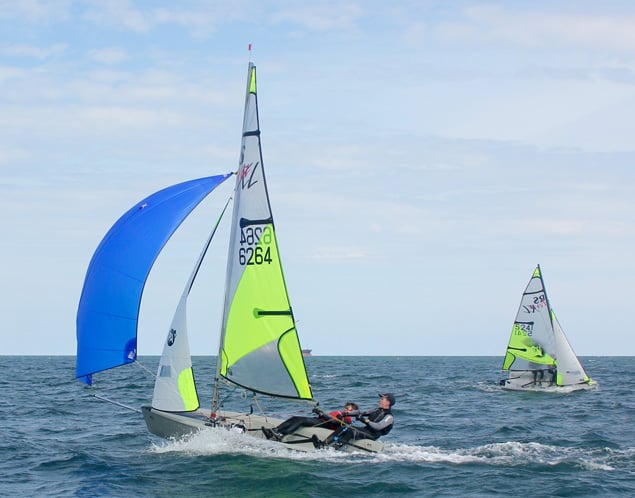 Irish Open RS Feva Champions, Eddie and Kevin Farrell from Llandudno Sailing Club. Photo courtesy of Stephanie Hogan
Irish Open RS Feva Champions, Eddie and Kevin Farrell from Llandudno Sailing Club. Photo courtesy of Stephanie Hogan
An excellent prize giving was held on Sunday afternoon. Hosted by event organiser Elaine Malcolm, there were lots of prizes for the Gold and Silver fleet, individual race winners and some special prizes too. Thanks to McCready Sailboats and A Stitch in Time for their support.
'RS Feva events are very special', says Garrett Donnelly from the RS Feva Association. 'There is extremely competitive racing taking place in the fleet, and with a range of ages from 10 and up, this is a fleet that truly accommodates and welcomes all sailors'. What you end up with is an eclectic bunch who share a love for sailing, for racing and of course for the Feva itself. 'What a great little boat it is. An excellent first two hander for any sailor that is adaptable from summer sailing courses to top level competition', he added.
“This was a classic Feva event, with sailors from 10 different clubs it had everything you could want in a youth sailing championship. It’s great to see young sailors enjoying themselves so much in two handed boats. Many thanks to our main sponsors Crane Hire Ltd and to the Royal St. George Yacht Club for hosting so magnificently” said Donnelly.
It's lining up to be an exciting week for youth sailing in Dun Laoghaire. The 2017 RS Feva Nationals take place over 3 days from 14 to 16 July at the Royal St. George Yacht Club.
As a warm up to the event there is a training session being held at the Royal St. George Yacht Club on Tuesday evening (July 11th) from 5:30 to 9:30.
In addition, the RIYC regatta is taking place on Wednesday (July 12th), providing another day of fun junior racing for the Fevas and other fleets.
With an asymmetric kite, the Feva is the most exciting dinghy available to children aged 11+ and provides a welcome alternative to the mainly single handed world of junior sailing. Fast, sociable, fun and requiring technical know-how, the Feva definitely ticks a lot of boxes. The World Championships are being held in Holland later this month with four Irish boats taking part in a 175+ boat fleet.
Starting next Friday (July 14th) there will be over 60 enthusiastic Feva sailors from more than 10 different clubs, enjoying close racing with 10 races spread over the 3 days.
There will be a Feva coach on hand for advise throughout the regatta, to help with last minute rigging issues and to make sure the sailors are having a good time with various on and off the water games planned. With Gold and Silver fleets and lots of prizes, all levels of ability are encouraged to come and take part.
Details including the Notice of Race and Online Entry are available here
No sooner has Howth Yacht Club completed its Spring Warmer Series for keelboats than it is preparing for its first dinghy event of the 2017 Summer season. HYC will host the RS Eastern Championship over the 22nd April and 23rd April.
The RS classes will be joined by Cork Harbour's travelling National 18s and the SB20 sportsboat class.
In the run up to the championships, the RS Feva class are staging a two day training session in Howth. Training is open to all sailors around the country regardless of ability. 20 boats are expected for the Easterns and there is a lot of renewed interest in the class now from Optimist sailors looking to try a two hander.
An early bird entry discount has been extended until tomorrow (April 12), according to HYC's Ross MacDonald. Enter here.
Irish RS Feva Sailors Aim For World Championships in Holland
Many Irish RS Feva youth sailors have travelled to World Championships over the years and it has been a great experience for many, giving teenagers their first taste of dinghy world championship competition. International fleet sizes tend to be around the 150 boats, split into Gold, Silver and Bronze fleets, so 'good friendly racing for all', is how it is promoted.
This year, the championships are in Holland and Team Ireland is well on its way to getting upwards of 10 boats to travel to Medemblik in July.
Planning for the trip is at an early stage and rather than everyone driving, the plan is to ship all the boats in a 40–foot container after the National Championships at the Royal St. George Yacht Club. That way, sailors and parents can fly and save a few days travelling. The class has also booked a rib for a coach for the week.
Clearly cost is an important factor in all of this. Preliminary figures for the World Championships trip are as follows, according to the latest RS Feva class Irish newsletter:
- Entrance Fee €360 per boat
- Shipping Boat €600 per boat (based on 10 boats in container, shipped, effectively, door to door)
- Coach Boat and Coach €250 per boat (based on 10 boats)
- Costs for flights, accommodation and food not included in the above
No Wind & Sea Fog Cancels RS Feva Racing At Greystones
The Irish RS Feva class were left waiting for wind on the second day of the National Championships at Greystones Sailing Club in County Wicklow today. Racing was cancelled at lunch time with little prospect of breeze for the remainder of the day. Three races were sailed yesterday. The final races of the annual championships are scheduled for tomorrow.
The next event on the circuit for the RS fleet is the Waterways Ireland Inland championships, being hosted by Lough Ree Yacht Club, on 23rd and 24th of July, All three fleets will be taking part in what was one of the highlights of the 2014 season, with lots of new comers to the fleet in both the 200s and 400s at their respective Westerns and Southerns event end of June, there should be tight racing across the board. This event will be a great one, with ample camping facilities on site.
This will be the last regional event before the fleets head for Schull for the National championships end of August.
The next RS Feva event is the Westerns in Galway next weekend – July 9th/10th as part of GBSCs DinghyWest.
The highlight of the year for the Fevas will be Feva Nationals, hosted by Greystones Sailing Club, making use of their fantastic new clubhouse and facilities. There are 10 races planned over the 3 days, and lots of social activities too. For the first time, the RS Feva class are taking a new approach to their Nationals, it will be held during the week from Mon 18th til Wed 20th of July.
All those who take part will be entered into a draw for a brand new Feva race jib, kindly donated by sponsors, McCready Sailboats. There will also be a separate prize for the first non XL (racing) sail – so even if you are sailing a club boat with training sails there will be good racing for you too. We are also hoping to get some parent and child teams competing – we have two potentially signed up already, and if we get 3 parent/child teams we will have a prize for that category. So….beg/steal/borrow a Feva/child and come and join in!!!
The Feva class will also be joining the 4s and 2s in Lough Ree for the Inlands on July 23rd/24th.
RS 400s, 200s & Feva Easterns At Royal St George Yacht Club
It was a weekend of superb sailing for the RS Fleets in Dublin Bay. Having the season opener in the east at the Royal St. George Yacht Club usually brings out a great fleet and that’s what we had with 42 boats across the three RS fleets at the Championships this year writes David Rose. Full results are downloadable below as PDF files.
The RS200’s is a class that is heating up considerably this season, with lots of quality sailors already in the fleet and a real injection of fresh competitors in the dinghy park. A few boats are sporting the sharp new design see-through sails, which make the boats look great as well as giving a better view of traffic on the race course.
The standard in the RS400 fleet has yet again gone up a notch. It is now more like the racing standard at a UK nationals or Europa cup. Our Olympian and multiple Fireball national champion turn Race officer for the weekend Barry O’Neil and his team were impressed by the standard of starting. “It was like Olympic class starting, all boats finding a lane and no mid–line sag. Not much bad behaviour and if the line was not 100% square then it was always going to result in a recall.”
Many thanks go to Barry and his team, including the mark layers giving their time on a bright but cold weekend. The team had to manage large wind shifts, and did so admirably. A new format for the courses was being used for this event. The RS200’s and RS400’s were sharing the same windward leeward, rather than in previous events where the trapezoid course was used for the RS200’s. This was making it hard for the OOD to adjust the course once the 200’s were off. Barry has given feedback already to the classes, and this may result in tweaks for future events.
Michael Keogh provided results and photography at the weekend, and Michael Tyrell was race officer for the RS Feva class, running a separate course inside the harbour.
Thanks go out to club Commodore Justin McKenna and vice commodore Michael Pomeroy and the RstGYC members. The facilities at the George are superb and the fleets really enjoy sailing out of the club. The welcome was extremely friendly and there were many people giving their time both at registration and with the smaller details like helping with trolleys.
Sailing Conditions
Day one was light to medium conditions averaging about 12 knots out of the North. There was a sometimes tricky short chop, and no shortage of oscillation on top of larger shifts that hung about for longer.
Day two had similar shifty conditions, again off the land and this time out of the North West, with more exciting gusts of 20 knots plus at times.
RS400 Easterns Report
What a weekends racing for the 20 top class teams that fought it out for national level honours this weekend. It’s a testament to the quality of the field that there were five different race winners over six races. The runner up for this regatta, was to be two time National RS400 champion Alex Barry with local sailor Conor Byrne as crew this time out. The pair were denied any race win in the series but were still extremely consistent as Alex has been for the last two seasons in the class.
Alex was gracious in defeat in round one of a long season and when asked for his thoughts on the weekend he said, “This weekend was exceptionally tight racing, in a fleet full of talent”.
Day one saw the excellence of MBSC sailors John Downey and Sandy Rimmington. They put out their stall early with a superb 2, 1, 6, on a day where most people had at least one bad result. The score was only bettered by one team and by one point. Gareth Flannigan and David Fletcher (BYC) had posted a 1, 2, and 5. Robert Espey and Michael Gunning (BYC) were very well placed also carrying a 3, 11, and 1.
Looking further down the sheet, local RstGYC stars and ex national champion Emmet Ryan and James Ryan were lying ninth, and needed to post some good results. They were to open day two with considerably more form carding a bullet. They finished the regatta stronger than they started moving to sixth overall one place ahead of Corks David Rose and Ian Heffernan in seventh.
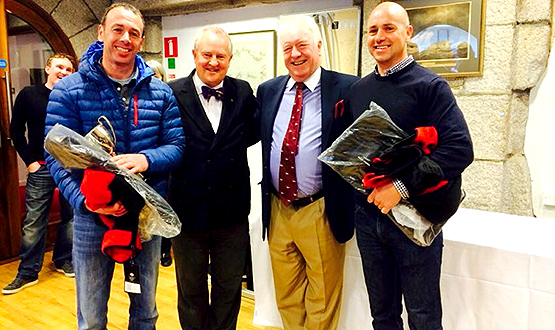
RS400 Winners (from left) Gareth Flanagan with Commodore Justin McKenna vice–Commodore Mike Pomeroy and David Fletcher
On day two it was Espey and Gunning who showed they mean business with a 3, 2 putting them slightly ahead of the two MBSC boats vying for the title, but it was not to be and after carding a tenth that they had to carry, they dropped off the podium and had to settle for fourth place. Bob said afterwards, “Once you find yourself in the pack it’s very hard to fight back”.
Flannigan and Fletcher are a class act and signed off with a second place to finish a sublime regatta and are 2016 Eastern Champions.
Alex and Byrne were second and John and Sandy took 3rd place this time out.
Chris Penny and Simon Martin had a superb regatta and finished on a high with a win in race six and fifth place overall.
So the early season honours and silverware have headed north with Flannigan and Fletcher, the other top teams will want to ensure they don’t have it all way and successfully pluck the Northern trophy from their grasp next time out.
RS Feva Report (By Elaine Malcolm)
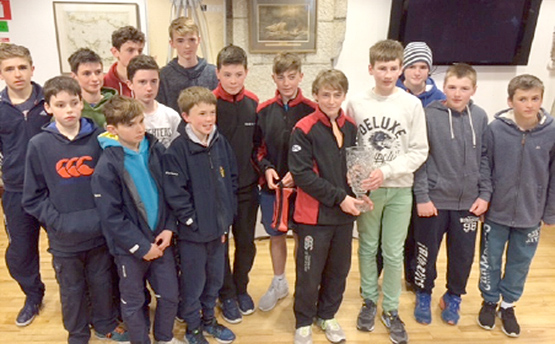
RS Feva Winners Henry Start and Morgan Devine with their competitors
In order to encourage the newer members of the RS Feva class this year, the Eastern’s were sailed on a separate course inside Dun Laoghaire harbour. The 11 boat fleet, under the capable race officer Michael Tyrrell and his team, had 8 races over the two days.
Local RstGYC sailors Henry Start and Morgan Devine were to master the conditions and win the event. They were challenged all the way by newcomers to the class, Tim Norwood and Finn Cleary from RIYC. The pair had stolen a march, winning three of the four races in light winds on Saturday.
Third place went to Marcus O’Leary and Jeff McGovern who just edged out the all-girl crew of Emily Arrowsmith and Caira Little. Malahide brothers Liam and Aidan Donnelly carded three third places on Sunday, showing their potential going forward.
Thanks go to our coaches at the weekend Pheobe Norwood and Meg Tyrrell, who provided plenty of encouragement all weekend. Congratulations to all who competed in the RS Feva Easterns.
RS 200 Report
11 RS200s turned out for the first event of the year, the fleet was more of a “mature” crowd, with lots of couple’s combos. This is an area of huge growth in the fleet, and should marry well with the younger contingent who often miss this event due to study commitments.
One of the new faces in the RS200 was multiple fleet dinghy and keelboat champion Neil Spain, who is sailing with his wife Maeve. Another top sailor out there was Women’s match racing star Mary O’Loughlin, joined by past Irish Olympic flag bearer Ciara Peelo as crew. Unsurprisingly they proved to be very competitive. We were also really pleased to have teams up from Caullan Sailing club, which has a very strong local fleet or RS200s.
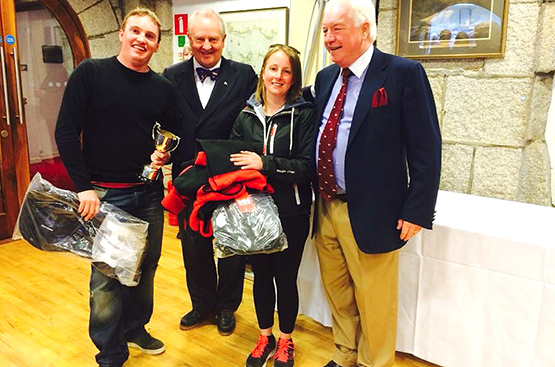
RS200 Winners Marty O’Leary and Rachel Williamson
On Saturday the fleet enjoyed 3 sharp 48 minutes races on the W/L course. Marty O’ Leary and Racehel Williamson showed their considerable pedigree. Marty was not distracted by being heavily involved in the organisation of the weekend for all classes. The pair put their stall out early and led overnight, to give themselves every chance of defending the title of which they were the holders.
It was very close from 2nd to 5th, with a point separating each team after day 1. Our former RS Fleet chairman Frank O’Rourke (GSC), sailing with college team racer Lisa Smith were the top challengers overnight.
So onto day two and the final 3 races of the championship. Sunday involved more breeze and even tighter racing as teams started to get more aggressive and accurate on the start line. O’Loughlin and Peelo seemed to think they were allowed to start before the competition, but were being a little too keen on two occasions and were duly recalled by the race management in races 4, and 5.
Craig and Cooney from the RStGYC showed some excellent pace and moved themselves up into 2nd overall going into the final race. They were not to go all the way however as the event was already signed sealed and delivered with one to go. Greystones O’Leary and Williamson had delivered another excellent performance which is the norm for this very talented pair who defend their title and remain RS200 Eastern Champions for 2016.
O’Loughlin and Peelo finally decided to start with everyone else in race six. This proved to be a very solid strategy as they have plenty of pace and lead the final race from start to finish. Frank and Lisa worked hard and managed to claw back 2nd place, leaving Craig and Cooney to take bronze a point ahead of the Spains.
See you all at the next event.



























